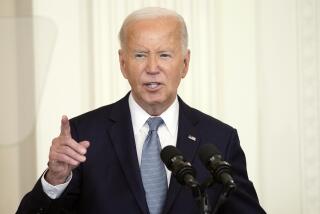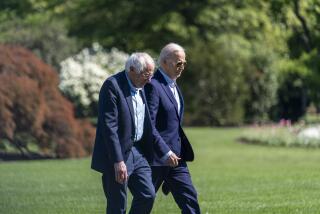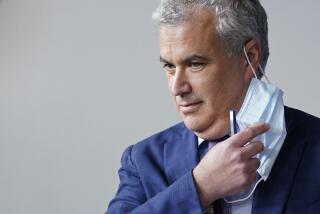Gore Builds Team, Readies His Solo Pitch : Politics: The vice presidential candidate is quickly pulling together a campaign staff. Some key roles will be filled by Clinton aides.
- Share via
CARTHAGE, Tenn. — Now comes the hard part.
After wowing the nation on his first campaign swing as Bill Clinton’s running mate, Tennessee Sen. Al Gore embarks next week on his first solo flight to promote the Democratic presidential ticket. But before doing so, he must have a campaign staff, a tightly knit cadre of handlers and strategists.
“We are still in a transition staff mode,” said Steve Silberman, a Clinton campaign staff member serving as a temporary adviser to Gore. “We have essentially built a pontoon bridge, something that gets you across the river for the short term while we’re building a Golden Gate Bridge for the fall elections.”
Rather than idly resting during his first break after the Democratic National Convention, Gore is spending this weekend at his rural Tennessee home in Carthage pulling together the team that will shepherd his vice presidential campaign.
Insiders predict that the team will consist primarily of loyal members of Gore’s Senate staff, with a sprinkling of Clinton operatives serving as a liaison between the ticket’s campaign headquarters in Little Rock, Ark., and Gore’s travel squad.
The anticipated abundance of Gore staff members reflects their more extensive background in foreign affairs and Washington politics--compared to most Clinton aides--as well as the senator’s influence within the Clinton campaign, observers said.
Yet the vice presidential nominee’s campaign will bear an unmistakable stamp of approval from Clinton’s operation, with some key roles filled by the Arkansas governor’s most trusted staffers.
“There is a key difference between running a U.S. Senate office and a vice presidential campaign,” said a campaign observer with experience running both a Senate office and a vice presidential campaign. “You don’t run the show as a vice presidential candidate and you do as a senator.”
Gore is expected to hit the campaign trail on his own next week, but his stops have yet to be decided. Staff members say it is likely he will visit some cities in the South, and he may travel to California toward the end of the week.
Resolving the uncertainty over where he goes--as well as other logistic and strategic choices--is made more difficult by having an incomplete staff, observers said.
Silberman said he expects Gore’s campaign team to be fully formed “in the next couple of days.” He also said the staffing process is proceeding smoothly because the Clinton campaign actually began working on it several days before Gore was named as the running mate.
In late June, Clinton asked Mark Gearan, one of his key campaign advisers, to supervise a group that would coordinate the transition through the convention for the vice presidential pick. That group was made up of about 10 political operatives who worked with previous Democratic vice presidential nominees--Texas Sen. Lloyd Bentsen in 1988 and former New York Rep. Geraldine A. Ferraro in 1984.
“We were determined to have some rational transition period to get the vice presidential nominee, whoever it would be, through the convention,” said one member of the group. “We met and talked about what would be needed and how we would do whatever was necessary for the vice presidential pick.”
While the group had no formal duties beyond the convention, most of its members were ready to extend their services into the fall campaign if the vice presidential choice lacked a ready-made or inexperienced staff. But Gore’s selection made such help unnecessary.
“Gore needed very little help,” said one member of the transition group. “He and his staff hit the ground running. Perhaps if he hadn’t had such a strong group of people surrounding him, we might have stayed around a lot longer. But that just wasn’t the case.”
Some of the transition staff--such as Gearan and John Kroger, Clinton’s second-ranking issues adviser--will remain on the Gore staff. Gearan is expected to travel on Gore’s plane, serving as the liaison with Clinton headquarters, and Kroger is to act as Gore’s issues adviser, campaign staffers said.
Gore Senate staff members expected to play prominent roles in his vice presidential effort are Roy M. Neel, his Senate chief of staff, and Marla Romash, his press secretary. Peter Knight, a former top aide, also has signed on for the campaign.
“There’s certainly a lot of sensitivity on both sides to make sure this thing goes very smoothly,” Silberman said. “It’s an interesting period where they’re all trying to figure out exactly what page everything is on, so they’re all working very closely with each other.”
While Gore and many of his Senate staff members have experience at presidential politics--Gore ran unsuccessfully for the nomination in 1988--he has no history in being the second banana in a political campaign.
That fact, some observers suggested, could be a point of friction with Clinton’s staff during this campaign. Concerns also surfaced that Gore might prove more interested in laying the groundwork for his own future presidential race than in advancing Clinton’s efforts.
Such speculation has been silenced in the wake of the obvious chemistry between the two men during their much-publicized bus tour from New York City to St. Louis following the convention. Indeed, the two candidates seemed to bond to each other during the six-day journey across a slice of the nation’s heartland, said Bob Squire, a Clinton campaign consultant.
Squire noted that at one point during the trip, Clinton began a sentence and, as he paused to collect his thoughts, Gore jumped in to offer virtually the same words the Arkansas governor was about to speak.
That incident convinced Squire that any potential tension between the two has subsided into “a relationship that is growing intellectually, emotionally and rhetorically,” he said.
But what occurs at the top often is quite different from the day-to-day machinations at the lower staff levels, where a campaign’s heavy lifting is performed.
“There is always going to be a certain amount of tension,” said one campaign observer.
Although no major problems have yet surfaced, “we’ve got some things to iron out,” one Clinton aide said in St. Louis after having spent nearly two weeks working with the Gore Senate staff members. “Naturally, different groups of people have different ways of doing business.”
Even before it is fully formed, Gore’s vice presidential campaign staff has begun to exhibit signs it is anxious to play an aggressive role in the presidential contest.
For example, the staff quickly went into an attack mode Friday in responding--without much consultation with the Clinton campaign--to charges leveled at Gore by Senate Minority Leader Bob Dole (R-Kan.).
Appearing on CNN’s “Evans and Novak” program, Dole accused Gore of being the butt of “an inside joke around the Senate” for trying to get prime television time to exhibit his vote against the Gulf War. Dole also suggested that Clinton’s description of Gore as a Vietnam War veteran was “very disingenuous” because Gore was a military journalist and did not serve in a combat unit.
Romash quickly produced a statement from her boss that defended his vote to support the war. “During Operation Desert Shield, I concluded that the threat Saddam Hussein posed to the Mideast and his actions in Kuwait warranted strong American military response,” Gore’s statement said. “I voted to authorize the use of force. I stand by that decision.”
Romash also lashed back with a statement in her name.
“It is ironic that Bob Dole, who was the victim of so many cheap shots from (President) George Bush, would be now taking cheap shots on behalf of George Bush,” she said. “It’s a sign of a (GOP presidential) campaign panicked and in trouble.
“Everybody who works with Sen. Dole, even those who like him such as Sen. Gore, know that political panicking brings out his dark side.”
More to Read
Get the L.A. Times Politics newsletter
Deeply reported insights into legislation, politics and policy from Sacramento, Washington and beyond. In your inbox twice per week.
You may occasionally receive promotional content from the Los Angeles Times.










